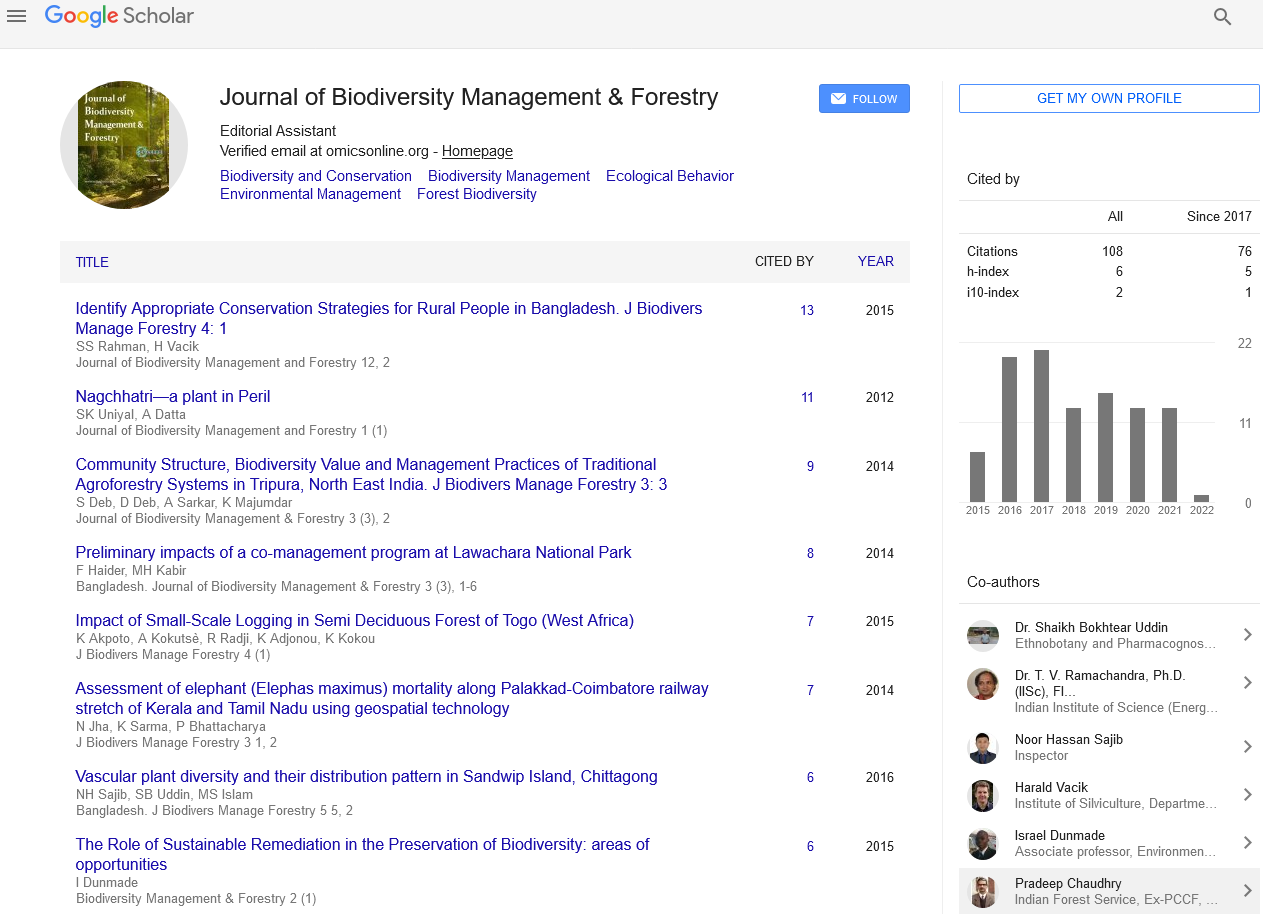Perspective, J Biodivers Manage Forestry Vol: 13 Issue: 3
The Importance of Forest Biodiversity for Ecosystem Services
Ivan Tan*
1Department of Biological Sciences, National University of Singapore, Outram, Singapore
*Corresponding Author: Ivan Tan,
Department of Biological Sciences, National
University of Singapore, Outram, Singapore
E-mail: ivan.tan@gmail.com
Received date: 02 February, 2024, Manuscript No. JBMF-24-144404;
Editor assigned date: 05 February, 2024, Pre QC No. JBMF-24-144404 (PQ);
Reviewed date: 20 February, 2024, QC No. JBMF-24-144404;
Revised date: 28 February, 2024, Manuscript No. JBMF-24-144404 (R);
Published date: 07 March, 2024, DOI: 10.4172/jbmf 2327-4417.1000071
Citation: Tan I (2024) The Importance of Forest Biodiversity for Ecosystem Services. J Biodivers Manage Forestry 13:1.
Description
Forests are one of the most biologically diverse ecosystems on the planet. They host a vast array of plant, animal, and microbial species that interact in complex ways, contributing to the overall health and functionality of these ecosystems. Forest biodiversity is not just about the variety of life within forests; it plays an important role in maintaining ecosystem services that are essential for human wellbeing and the health of the planet. This discuss into the importance of forest biodiversity for ecosystem services, the threats to this biodiversity, and the steps needed to preserve it.
Ecosystem services are the benefits that humans derive from natural ecosystems. Forests provide a wide range of these services, many of which are directly linked to the biodiversity within them. Here are some of the key ecosystem services provided by forest biodiversity. Forests play a significant role in regulating the Earth's climate. They act as carbon sinks, absorbing carbon dioxide from the atmosphere and storing it in biomass and soil. This process mitigates the effects of climate change by reducing the concentration of greenhouse gases. Diverse forests, with a variety of plant species, are more effective at sequestering carbon because different species have varying capacities for carbon storage and uptake. Additionally, diverse forests are more resilient to disturbances, such as pests and diseases, which can affect their ability to sequester carbon. Forest ecosystems are perilous for the regulation and purification of water.
Trees and other vegetation help to filter pollutants from water, improve water quality, and regulate water flow. Forest biodiversity enhances these processes because different plant species have varying root structures and functions, contributing to the filtration and absorption of water. Healthy forests also reduce soil erosion and prevent sedimentation in water bodies, maintaining clean and stable water supplies for human use and aquatic life. Soil formation and maintenance are fundamental ecosystem services provided by forests. The diverse root systems of forest plants help to bind soil, prevent erosion, and enhance soil structure. Leaf litter and organic matter from a variety of plant species contribute to nutrient cycling and soil fertility. Decomposers, such as fungi and bacteria, play a grave role in breaking down organic matter, releasing nutrients that are essential for plant growth. Forest biodiversity ensures a continuous supply of these essential services, supporting both natural and agricultural ecosystems.
Many forest plants rely on animals for pollination and seed dispersal. Insect pollinators, such as bees and butterflies, and vertebrate pollinators, such as birds and bats, are integral to the reproduction of numerous plant species. A diverse forest ecosystem supports a wide range of pollinators and seed dispersers, enhancing the reproductive success of plants and the regeneration of forests. This biodiversity is vital for the production of fruits, nuts, and other resources that humans and wildlife depend on. Forests provide a multitude of provisioning services, including timber, fuelwood, nontimber forest products (such as medicinal plants, fruits, and nuts), and genetic resources. The diversity of species within forests contributes to the availability and sustainability of these resources. For instance, different tree species provide various types of wood with distinct properties suitable for different uses. Similarly, a variety of plants and animals supply diverse food and medicinal products, supporting local and global economies. Forests have significant cultural, spiritual, and recreational value. They offer spaces for recreation, tourism, and education, enhancing human well-being and mental health.
Diverse forests, with their rich tapestry of life, provide unique experiences and opportunities for learning and inspiration. Many indigenous and local communities have deep cultural and spiritual connections to forests, and the biodiversity within these ecosystems is integral to their traditions and ways of life. Deforestation, driven by agriculture, logging, and infrastructure development, leads to the loss of habitat for countless species. Habitat fragmentation further exacerbates this issue by isolating populations and reducing genetic diversity, making species more vulnerable to extinction. Climate change impacts forest ecosystems through shifts in temperature, precipitation patterns, and the frequency of extreme weather events. These changes can alter species distributions, disrupt ecological interactions, and increase the vulnerability of forests to pests and diseases.
 Spanish
Spanish  Chinese
Chinese  Russian
Russian  German
German  French
French  Japanese
Japanese  Portuguese
Portuguese  Hindi
Hindi 
